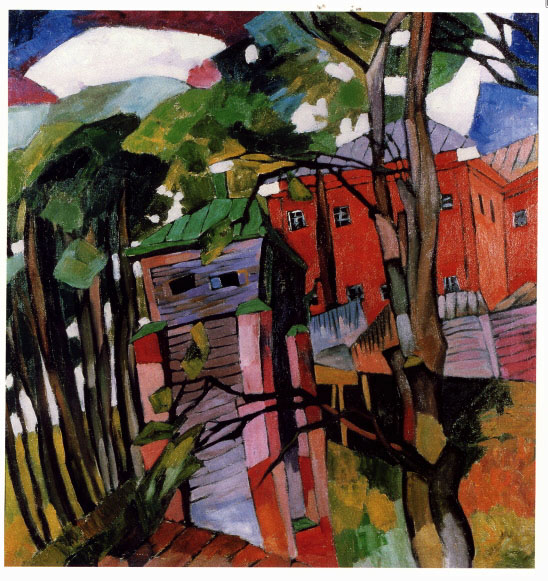|
|
Selections:
the Red Inn
When the two young men reached Andernach, it was past nightfall. Concluding
that they would lose too much time in seeking out their superiors, making
themselves known, and obtaining billets in a town already crowded with
soldiers, they had decided to spe nd their last night of freedom at an
inn just outside the town. They had caught a glimpse of it earlier, from
the top of the cliffs, and had admired its rich coloring, heightened by
the glow of the setting sun. Painted entirely in red, this inn produced
a striking effect in the landscape, whether standing out against the general
background of the town, or contrasting its crimson curtain with the green
shades of foliage, its brilliant hue with the grayish tones of the water.
Since time immemorial, the hous e owed its name to the exterior decoration
which, doubtless, had been imposed upon it by the whim of its builder.
A quite natural mercantile superstition among the various owners of the
establishment, which had a reputation among the Rhenish boatmen, had caused
this custom to be scrupulously preserved.

Whether because his bed was too hard, or because of insomnia brought on by extreme fatigue, or perhaps owing to a fateful frame of mind, Prosper Magnan was unable to sleep. Imperceptibly, his thoughts began to take an ominous turn. He could think of noth ing but the hundred thousand francs that lay beneath the merchant's pillow. For him, a hundred thousand francs was a vast and ready-made fortune. He began by parceling it out in a hundred different ways building castles in the air as we are all so happily prone to do in the moments preceding sleep, when confused images are born in I our minds and when, in the silence of the night, thought often assumes a magical potency. He gratified his mother's every wish and desire, he bought the thirty acres of meadow land, he married a young lady of Beauvais to whom the disparity of their fortunes presently forbade him to aspire. With this sum he mapped out a lifetime of felicity, and envisioned himself the happy head of a family, rich, respected in his province, and perhaps mayor of Beauvais.
His Picardian brain took fire, and he cast about for means of turning
these fictions into realities. With extraordinary ardor, he began to devise
a theoretical crime. As he fantasized the death of the merchant, gold and
diamonds danced before his eyes. H e was bedazzled by them. His heart was
pounding. The deliberation was itself, undoubtedly, a crime. Mesmerized
by that mass of gold, he grew mentally intoxicated by means of sanguinary
logic. He asked himself if there was really any need for that poor Ger
man to live, and imagined that he had never existed. In short, he, plotted
the crime in such a way as to ensure himself impunity. The opposite bank
of the Rhine was occupied by the Austrians beneath the windows lay a boat
and boatmen; he could slit the ma n's throat, throw the body into the Rhine,
escape through the window with the bag, bribe the boatmen with gold, and
cross over into Austria. He went so far as to calculate the degree of skill
he had acquired in the use of his surgical instruments, so as to sever
the head of his victim before he could utter a cry...."

"Prosper slowly got out of bed without making a sound. Certain of having awakened no one, he dressed and went into the public room; then, with that fatal intelligence that men suddenly find themselves to possess, with that willpower and poise which never fail prisoners or criminals in the execution of their schemes, he unscrewed the iron bars, slipped them from their sockets without the slightest noise, lay them against the wall, and opened the shutters, pressing the hinges to keep them from creaking. Th e moon, casting its pale light upon the scene, enabled him vaguely to distinguish the objects in the room where Wilhelm and Walhenfer were sleeping. There, he told me, he paused for a moment. The beating of his heart was so rapid, so violent, so loud, tha t he was almost overcome. He began to fear for his composure; his hands trembled, and the soles of his feet seemed to rest on redhot coals. But so much good fortune hung upon the execution of his plan that he fancied he saw a kind of predestination this g ift of fate. He opened the window, returned to the bedroom, took out his case, and selected the instrument most suitable for carrying out his crime.
"When I reached the bed,' he told me, 'I automatically commended myself to God.'
"At the moment when, summoning all his strength, he raised his arm, he heard a sort of voice within him, and thought he saw a light. He flung the instrument on his bed, escaped into the other room, and stood in front of the window. There, he was seized w ith the utmost horror at himself; feeling nonetheless his virtue faltering, fearing that he might still succumb to the spell that was upon him, he jumped quickly down to the road and began walking along the bank of the Rhine, pacing like a sentinel in fro nt of the red inn. Again and again he went as far as Andernach in his headlong rovings; often, too, his feet led him to the foot of the slope he had descended on his way to the red inn; but the night was so still, and he had such faith in the watchdogs, that now and then he lost sight of the window he had left open. His goal was to exhaust himself and hasten the approach of sleep.